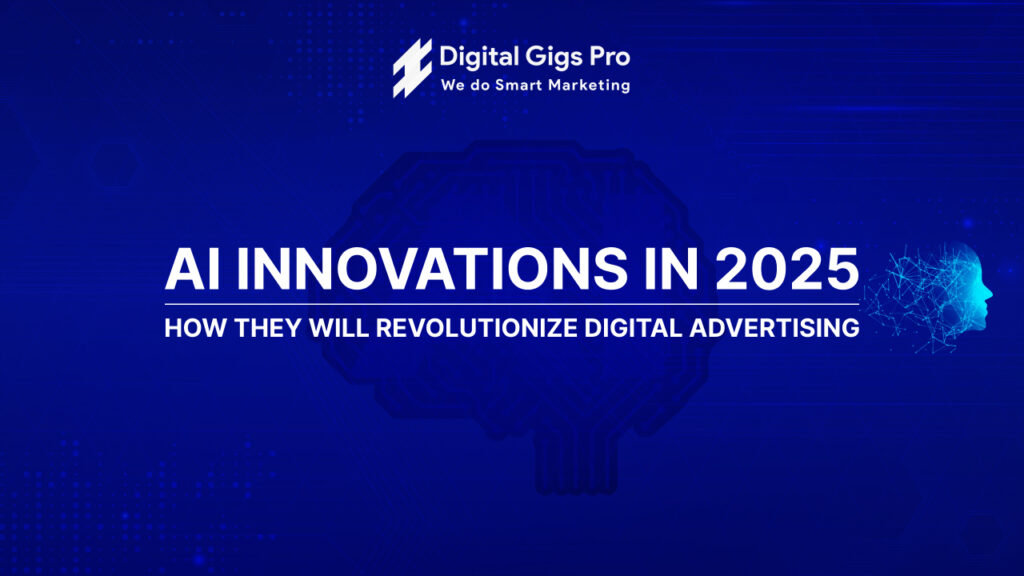Intoduction
The advertising industry has seen groundbreaking shifts with the integration of artificial intelligence (AI). In 2025, AI innovations promise to transform digital advertising by offering brands unparalleled tools to connect with their audience. With capabilities like hyper-personalized ads, real-time data analysis, and predictive insights, AI is setting new standards in ad performance. This blog explores the key AI-driven advancements that are revolutionizing digital advertising in 2025.
AI-Powered Personalization: Tailored Experiences at Scale
One of the most significant contributions of AI to digital advertising is its ability to deliver personalized experiences.
Dynamic Ad Customization
AI allows advertisers to create ads that adapt to user behavior in real time. For instance, e-commerce brands can showcase products a user has browsed or abandoned in their cart, boosting click-through rates and conversions.
Individualized Content Recommendations
AI-driven algorithms analyze user preferences to recommend content that aligns with their interests. Platforms like YouTube and Netflix excel in using AI for personalized content delivery.
Predictive Analytics: The Key to Smarter Campaigns
Predictive analytics powered by AI takes the guesswork out of ad targeting and optimization.
Forecasting Consumer Behavior
By analyzing past user data, AI can predict what products or services customers are likely to need next. This enables businesses to stay ahead of consumer demands.
Campaign Performance Optimization
AI tools like Google Ads’ Performance Max utilize predictive insights to allocate ad budgets efficiently, ensuring every dollar spent delivers maximum ROI.
Pro Tip: Leverage tools like Salesforce Einstein or Adobe Sensei for AI-driven campaign insights.
Enhanced Ad Targeting: Reaching the Right Audience
AI innovations are refining how advertisers target their ideal audience, ensuring better results.
Behavioral and Contextual Targeting
AI analyzes browsing habits, purchase history, and even context to serve ads at the perfect moment. For example, a user searching for “best smartphones” might instantly receive ads for the latest phone deals.
Geo-Targeting with Precision
Location-based AI targeting helps businesses focus on customers in specific geographic areas. This is particularly beneficial for local businesses and events.
Example: A restaurant can run ads for nearby customers during lunch hours to boost foot traffic.
Conversational AI: Engaging Customers Directly
AI-powered chatbots and virtual assistants are enhancing customer interaction and driving ad engagement.
Chatbots for Instant Engagement
Platforms like Facebook Messenger and WhatsApp now use AI chatbots to interact with customers, answer queries, and guide them toward making a purchase.
Voice Search Integration
With the increasing popularity of voice assistants like Alexa and Google Assistant, brands can create ads optimized for voice commands, improving accessibility and reach.
AI in Video Advertising: The Next Frontier*
Video content is king, and AI is making video ads smarter and more impactful.
Automated Video Creation
AI tools like Pictory and Synthesia allow advertisers to create professional video ads quickly and at a fraction of the cost. These tools can also tailor videos for specific demographics.
Performance Tracking in Real Time
AI enables marketers to track how users engage with video ads, such as click-through rates, watch time, and drop-off points. These insights help refine future campaigns.
Challenges and Ethical Considerations in AI Advertising
While AI offers immense potential, it also raises ethical questions and challenges.
Balancing Personalization and Privacy*
Excessive personalization can make users feel uncomfortable. Advertisers must ensure they’re not crossing ethical boundaries while collecting data.
Avoiding Algorithm Bias
AI systems can unintentionally reflect biases in the data they’re trained on. Regular audits and diverse datasets can help mitigate this issue.
Conclusion
AI innovations in 2025 are redefining digital advertising, making campaigns more efficient, targeted, and impactful. From personalized ads to predictive analytics, the possibilities are endless. However, businesses must adopt these technologies responsibly, balancing innovation with ethical considerations.

